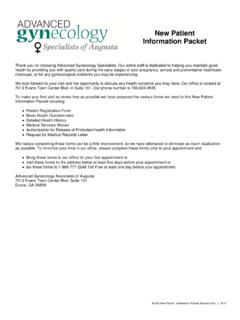Transcription of UPDATE - NY Visa Lawyer
1 MERGERS & ACQUISITIONS UPDATE Karin Wolman Copyright 2002 All Rights Reserved3 Biographical Information Program Title: Mergers & Acquisitions UPDATE Name: Karin Wolman [Program Speaker: David Grunblatt] Position or Title: Associate Firm or Place of Business: Wildes, Weinberg, Grunblatt & Wildes, Address: 515 Madison Avenue Phone: (212) 753 3468 Fax: (212) 753 3866 E Mail: Primary Areas of Practice: aliens of extraordinary ability in business & the arts, H 1Bs, intra company transferees, religious workers Law School: UCLA School of Law, 1990 Work History: Wildes, Weinberg, Grunblatt & Wildes, 1998 present Law Offices of Susie Kim, 1996 1998 Brooklyn Academy of Music, 1991 1995 Membership in Associations, Committees, etc.
2 : American Immigration Lawyers Association, Association of the Bar of the City of New York5 Table of Contents A. I 9 NONIMMIGRANT A. Memoranda and Advisory Letters from INS on the M& A B. H 1B C. Other H workers/H 3 D. E 1 Treaty E. E 2 Treaty F. L 1 Intracompany G. F 1 Students with H. J 1 exchange I. O 1 aliens of extraordinary J. TN professionals under LABOR CERTIFICATION ANDI 140 A. Labor B. E11 Aliens of Extraordinary C. E12 Outstanding Researchers & D. E13 Multinational Managers & E. E21 Regular National Interest F. E21 Physician National Interest THE ALIEN FOR I. INTRODUCTION This article is intended to give an updated overview of how mergers and acquisitions affect alien employees, and a practical roadmap for handling changes in a employer s ownership or corporate structure.
3 As many commentators have lamented over the years, immigration lawyers are all too often called upon to advise a corporate client on the effects of such changes after the fact, when it is a done deal and some of the company s nonimmigrant employees may have already fallen out of status. Clients often want to know, what is the impact of proposed changes in corporate structure or identity on the company s alien employees? Unfortunately, there is no simple bright line test, and the answer to this question will often hinge upon whether the employing entity that results from a corporate change in ownership or identity is a new employer or a successor in interest. Since most employment based nonimmigrant visa categories only grant the alien authorization to work for one specific company, a new employer will be required to file a petition with the Immigration & Naturalization Service (INS) or in some cases have the alien make a new application at a consulate or border post.
4 A entity that becomes the alien s employer as a result of a merger or acquisition may not have to make such a filing if it can demonstrate that it is a successor in interest that has effectively assumed the immigration related rights, obligations and liabilities of the originally approved employer. As the impact of any corporate change will always depend on the alien worker s visa status, this article is divided into subsections dealing with the different visa Once the impact of a corporate transaction on the company s nonimmigrant employees is known, there are the practical questions of who must be notified of such changes, with what documentation, and when? Since documentation may be required by the INS, the Department of Labor (DOL), or both, this article will address when amended filings are required by the INS and by the DOL, what documents to prepare and retain where something less than an amended filing is required, and when to give formal notice of a corporate change to the alien, to facilitate travel or visa issuance.
5 For purposes of this article, the phrase changes in corporate ownership or identity will serve as shorthand for the infinite variety of changes in corporate ownership, identity and organizational structure which may result from mergers, acquisitions, spin offs, asset purchases, stock purchases, reorganizations, etc. A thorough discussion of the most common types of these transactions is beyond the scope of this article, which will only examine the effects of the transaction as they relate to maintenance of status and work authorization for alien employees in each visa category. A. I 9 DOCUMENTATION The regulations on employment eligibility verification allow a related, spin off, successor company or reorganized employer that results from a restructuring, merger, stock or asset purchase to meet its I 9 obligations by maintaining the I 9 files inherited from the previous employing entity, rather than requiring the completion of new I 9s for all inherited employees.
6 1 However, that provision only serves to protect the successor entity against employer sanctions for any 1 8 CFR (b)(1)(viii)(A)(7)9 paperwork violations relating to the inherited employees. 2 It does not constitute an affirmative grant of employment authorization. The key concern for the employer is ensuring that the inherited nonimmigrant employees maintain their status, which leads back to an examination of each alien worker s visa status. As discussed in greater detail in a panel discussion held on June 15, 2000, and reprinted in two parts in Bender s Immigration Bulletin 3 , since most nonimmigrant visa classifications are employer specific, and the eligibility requirements for each visa category are different, the employer and counsel need to conduct a thorough immigration audit prior to a merger, acquisition, or other contemplated transaction, to assess the nonimmigrant employees in groups, by visa category.
7 Once a worker s nonimmigrant status has been safeguarded for the short term, the impact of the corporate change on that worker must then be reviewed for its long term effects, to determine how, and if it is possible, to preserve the viability of any labor certification application or immigrant visa petition filed on behalf of that worker. II. PRESERVING NONIMMIGRANT STATUS Recent statutory additions have brought some concrete improvements, at least to H 1B nonimmigrants, in the form 2 Ibid. 3 It Ain t Over Till It s Over: Immigration Strategies in Mergers, Acquisitions and Other Corporate Changes, Bender s Immigration Bulletin, Vol. 5. (Oct. 1, 2000) & Vol. 5, No. 20 (October 15, 2000), with Angelo Paparelli, Alan Tafapolsky, Ted Chiappari, Susan Cohen, andStephen Yale Loehr10 of new sections INA 214(m)(1) 4 , authorizing portability for workers in H 1B status, and INA 214(c)(10) 5 , which provides that changes to the corporate entity will not require an amended H 1B petition, if the new employing entity succeeds to the interests and obligations of the predecessor.
8 Amended petitions will still be required in situations where the new entity does not explicitly assume all immigration related liabilities and obligations of the original petitioner. INA 214(m)(1) (m)(1) A nonimmigrant alien described in paragraph (2) who was previously issued a visa or otherwise provided nonimmigrant status under section 101(a)(15)(H)(i)(b) is authorized to accept new employment upon the filing by the prospective employer of a new petition on behalf of such nonimmigrant as provided under subsection (a). Employment authorization shall continue for such alien until the new petition is adjudicated. If the new petition is denied, such authorization shall cease. INA 214(c)(10) An amended H 1B petition shall not be required where the petitioning employer is involved in a corporate restructuring, including but not limited to merger, acquisition or consolidation, where a new corporate entity succeeds to the interests and obligations of the original petitioning employer and where the terms and conditions of employment remain the same but for the identity of the petitioner.
9 A concept that has long been present in the INS regulations, but is not formally and consistently defined therein, is the material or in some cases substantive change. This is a 4 Added by Section 105(a) of the American Competitiveness in the Twenty First Century Act of 2000, 114 Stat. 1251, 106 313, enacted Oct. 17, 2000. 5 Added by Section 401 of the visa Waiver Permanent Provision Act, 106 396, enacted October 30, common benchmark of when an amended petition must be filed. 6 In most employment based visa categories, normal incremental changes in the upward direction such as getting a promotion, a raise, or moving to a new office nearby are usually not deemed material, but lateral changes such as switching to a new job function in a different department, and downward adjustments such as salary reductions, are usually material.
10 This article will address the circumstances and visa categories under which a change to the corporate entity as a whole may be deemed material to the alien worker s maintenance of status and his or her continued eligibility for that visa classification. 8 CFR (h)(2)(i)(D) Change of employers. If the alien is in the United States and seeks to change employers, the prospective new employer must file a petition on Form I 129 requesting classification and extension of the alien s stay in the United The alien is not authorized to begin the employment with the new petitioner until the petition is approved. An H 1C nonimmigrant alien may not change employers. This sounds clear enough at first: where an entity is a new employer, the entity must file a new petition, and cannot employ the alien until the petition is approved.




